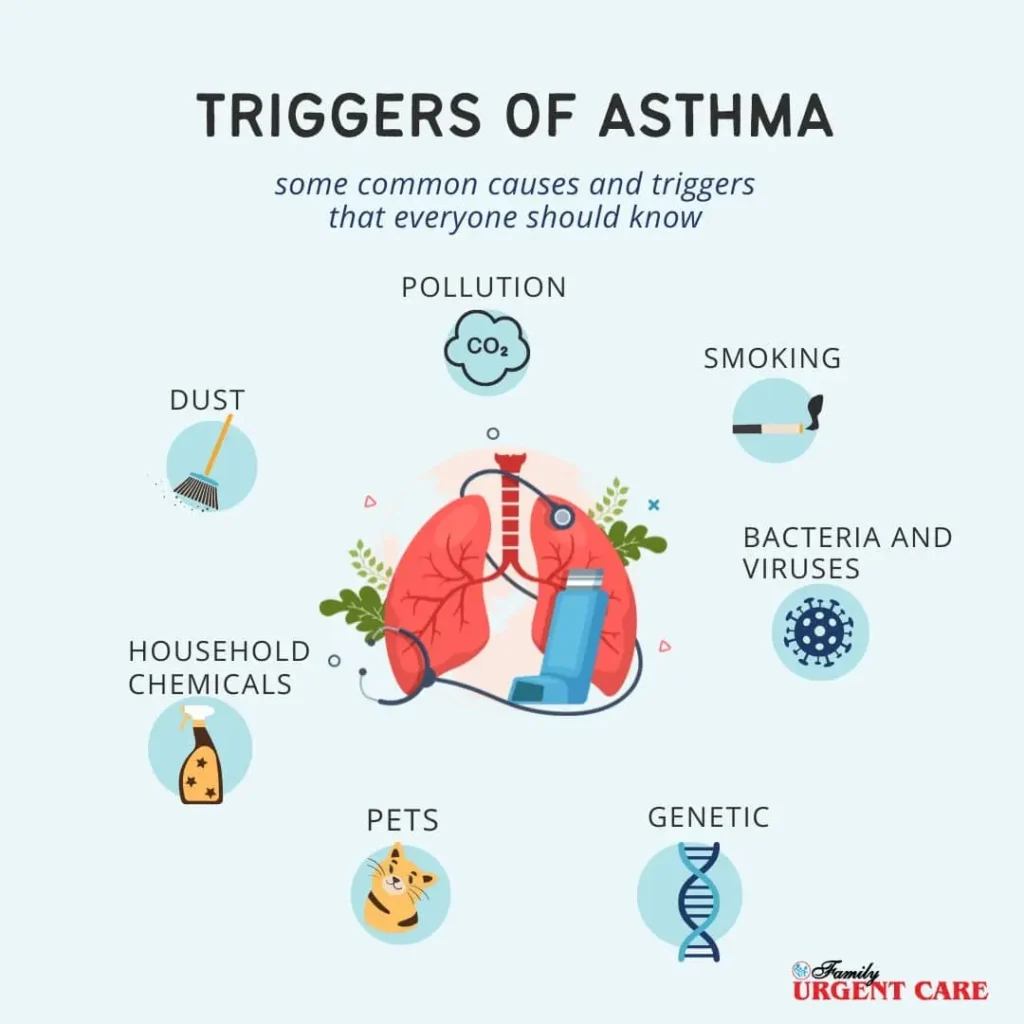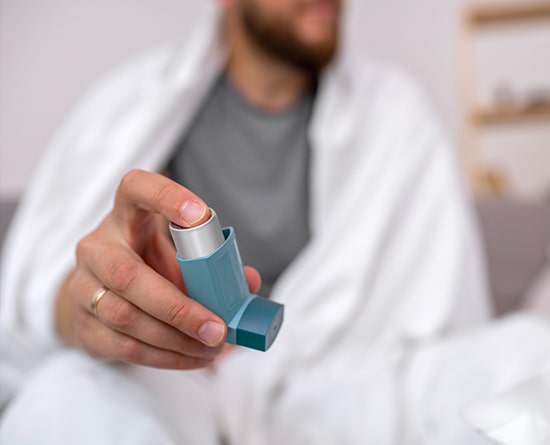Get Asthma Treatment At Fam Urgent Care
Asthma can turn something as simple as breathing into a daily challenge and during a flare-up, even walking across the room can leave you gasping for air.
Over 27 million people in the U.S. live with asthma and at Family Urgent Care, we’re here to help you manage it with confidence.
Whether you’re dealing with occasional wheezing or regular attacks, our team of experienced healthcare providers in Illinois and Indiana can help you understand your triggers, treat your symptoms, and prevent future flare-ups – all in a single visit.
Some Common Symptoms Of Asthma
During an asthma attack, people mostly experience symptoms, such as:
- Wheezing (high-pitched whistling sound from the chest during breathing)
- Shortness of breath
- Chest tightness or pain and discomfort
- Unable to sleep due to difficulty in breathing or chest tightness
However, the symptoms might vary from person to person, depending on the type of asthma you have and your current medical condition.
What Triggers Asthma And How You Can Avoid It?

Dust, Smoke, and Air Pollution
Every day irritants like dust, smoke, strong fumes, or even cold air can inflame your airways and lead to a flare-up.Allergies
Pollen, pet dander, mold, and even certain foods can trigger allergic reactions that make asthma worse. Some people with eczema or hay fever are more likely to develop asthma too.Family History
If asthma runs in your family, you’re more likely to develop it yourself, especially during childhood.Workplace Exposure
Jobs that involve chemicals, dust, or fumes (like construction, cleaning, or animal care) can lead to what’s called occupational asthma.Smoking
Cigarette smoke is one of the most harmful triggers. Even just being around someone who smokes can make breathing harder for people with asthma.Common Types Of Asthma
Non-allergic Asthma
Triggered by cold air, strong smells, stress, or exercise. It’s common in adults and often harder to spot, since there’s no clear allergy involved.
Allergic Asthma:
It’s caused by allergens like pollen, pet dander, mold, dust, or fumes, which can tighten and inflame your airways, making it harder to breathe.
Occupational Asthma:
Almost 15% of cases of asthma in the US are work-related. If your job exposes you to dust, chemicals, animals, or fumes, you might notice symptoms worsening during or after work.
Seasonal Asthma:
Some people experience asthma flare-ups at specific times of the year, like during hay fever season or cold weather. This is commonly referred to as seasonal asthma.
Exercise-induced Asthma
Exercise-induced asthma occurs due to high-intensity physical exertion or workout. It can trigger airway narrowing and exacerbate asthma symptoms, such as coughing, wheezing, or shortness of breath.
What Precautions Can You Take To Prevent Asthma Attacks?

Managing asthma begins with identifying your triggers and making a few informed adjustments to your daily routine. Here are some easy, effective ways to reduce flare-ups:
- Avoid common triggers like smoke, dust, pollen, pet dander, and strong chemical odors.
- Keep your indoor air clean by minimizing dust mites, using air purifiers, and regularly cleaning surfaces.
- Practice good hygiene, frequent hand washing can help prevent respiratory infections that often exacerbate asthma.
- Stay up to date on flu vaccines if recommended by your provider, especially during peak seasons.
- Take your prescribed medications (like inhalers or nebulizers) exactly as directed, even when you’re feeling fine.
When To Visit Family Urgent Care?
If you’re experiencing unusual or worsening asthma symptoms, don’t wait it out! Early treatment can prevent serious complications.
Here are your signs to visit an urgent care clinic right away:
- You feel weak, dizzy or you have trouble doing your routine tasks.
- You experience a cough, wheezing or notice any unusual breathing pattern.
- You have taken your quick-relief medicines or inhalers, but your symptoms don’t improve.
- Persistent shortness of breath or tightness in the chest while lying in bed.
At Family Urgent Care, we have board-certified medical experts who commit to serving patients with high-quality care. You can also visit Family Urgent Care seven days a week at your convenience in three different locations: Rogers Park, Lincoln’s Park and Schererville.
Frequently Asked Questions
Steam may provide short-term relief by loosening mucus and soothing dry airways, but it’s not a reliable treatment for asthma. In fact, steam can sometimes make symptoms worse for some people, especially if the air is too hot or humid. Always consult your provider before trying home remedies.

